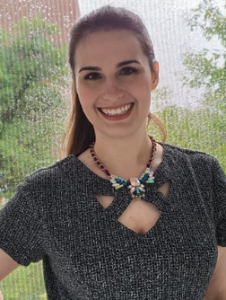Dr. Briana Bettin will present a New Faculty Lecture on Friday, November 12, 2021, at 3:00 p.m. in Rekhi 214. Dr. Bettin is an assistant professor in both the Computer Science and the Cognitive and Learning Sciences departments. Her research interests span education, experiential design, and human factors. Her talk is titled, “Facets and Inclusions: Analogy as a Transformative Tool for Navigating CS Curricula.”
Abstract: Our increasingly digital society requires citizens to effectively communicate about and with computing technologies in order to thrive. Learning to navigate the digital landscape and computing topics can be immensely challenging. Shifting to “think like a programmer” is often challenging, and why the machine behaves as it does can appear antithetical to “the real world” assumptions students are used to in their daily lives. Coupled with stereotypical notions on the difficulty and societal impacts of computing and programming, students can easily become frustrated and discouraged from learning necessary skills and topics for the fourth industrial revolution.
This talk explores how using analogical representations to convey computing concepts and ideas can transform student relationships with computing material. Tying the “difficult novelty” of computing topics to lived experiences can help machine behaviors become relatable rather than flummoxing. Creative and cultural expressions using analogical representations create further avenues for CS curricular transformation, allowing students to foster their sense of self and community in relation to their computing studies. The lived experiences of students have many angles, and learning computing topics is a path paved with flaws. By transforming curricular dialogues to center students and their existing understanding, we can use these facets and inclusions to transform their experiences learning computer science.
Biography: Briana Bettin’s research blends user experience methodologies with education research to better understand programming students and the impacts of the classroom environment. She is a member of the Institute of Computing and Cybersystem’s (ICC) Computing Education research group.
